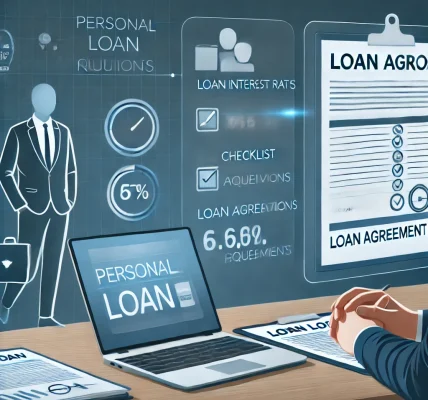Starting a business requires a solid financial foundation, and securing the right business loan can be a game-changer for entrepreneurs. With various loan options available, choosing the best business loan for your startup depends on factors like interest rates, repayment terms, and loan features. In this guide, we will explore the top business loans for startups, their features, and the benefits they offer.
Why Business Loans Are Essential for Startups
- Capital for Growth – Helps fund new business operations, inventory, or expansion.
- Maintains Cash Flow – Ensures smooth day-to-day operations without financial strain.
- Builds Business Credit – Establishes a financial history that can help in future loan approvals.
- Flexible Repayment – Many loans come with customized repayment plans to suit business needs.
- Tax Benefits – Interest paid on business loans is often tax-deductible.
Types of Business Loans for Startups
1. Term Loans
- Traditional bank loans offered for a fixed term.
- Suitable for startups needing substantial funding.
- Requires good credit history and collateral.
2. SBA Loans (Small Business Administration Loans)
- Government-backed loans offering low interest rates.
- Ideal for startups with limited financial history.
- Longer repayment terms compared to other loans.
3. Business Line of Credit
- Flexible loan where you can withdraw funds as needed.
- Interest is charged only on the amount used.
- Helps manage short-term expenses and emergencies.
4. Equipment Financing
- Designed specifically for purchasing business equipment.
- The equipment itself acts as collateral.
- Suitable for startups requiring machinery, tools, or vehicles.
5. Invoice Financing
- Allows businesses to borrow against unpaid invoices.
- Best for startups facing delayed payments from clients.
- Improves cash flow without long-term debt.
6. Merchant Cash Advances (MCA)
- Lump sum cash advance based on future sales.
- High interest rates but quick funding.
- Suitable for businesses with strong daily sales transactions.
7. Microloans
- Small loans designed for startups and new entrepreneurs.
- Typically provided by nonprofit organizations and lenders.
- Best for businesses needing smaller capital amounts.
8. Venture Debt Financing
- Available to startups backed by venture capital firms.
- Used as a supplement to equity funding.
- Best for high-growth startups with strong investor backing.
Top Business Loan Providers for Startups
| Lender | Loan Type | Interest Rate | Loan Amount | Repayment Term |
|---|---|---|---|---|
| Bank of America | Term Loan | 6% – 10% | Up to $250,000 | 5 – 10 years |
| SBA (Small Business Administration) | SBA Loan | 4% – 7% | Up to $5 Million | 10 – 25 years |
| Kabbage | Business Line of Credit | 9% – 24% | Up to $250,000 | 6 – 18 months |
| OnDeck | Term Loan | 10% – 30% | Up to $500,000 | 1 – 5 years |
| Fundbox | Invoice Financing | 4% – 8% | Up to $150,000 | 3 – 12 months |
How to Choose the Best Business Loan
- Determine Your Needs – Identify the purpose of the loan (working capital, equipment, expansion, etc.).
- Compare Interest Rates – Look for the most affordable option to minimize debt burden.
- Check Eligibility Requirements – Ensure your credit score, revenue, and business history match the lender’s criteria.
- Assess Repayment Terms – Choose a repayment plan that aligns with your business cash flow.
- Look for Additional Benefits – Some loans offer perks like deferred payments, cashback rewards, or free financial consultation.
Benefits of Business Loans for Startups
- Quick Access to Funds – Many lenders offer fast approval and disbursement.
- Improves Business Growth – Enables scaling operations, hiring employees, and marketing expansion.
- Retains Business Ownership – Unlike equity financing, loans don’t require giving up shares in the company.
- Flexible Repayment Options – Many lenders offer tailored repayment plans to suit startups.
- Enhances Credit Score – Timely repayments build a strong business credit profile.
Common Mistakes to Avoid When Applying for a Business Loan
- Not Understanding Loan Terms – Read the fine print to avoid hidden fees.
- Ignoring Credit Score – A low credit score can lead to high interest rates or loan rejection.
- Borrowing More Than Needed – Only take what your business can afford to repay.
- Skipping Lender Comparison – Different lenders offer varying interest rates and terms.
- Missing Repayment Deadlines – Late payments can harm your credit score and lead to penalties.
FAQs About Business Loans for Startups
1. What is the easiest business loan to get for a startup?
Microloans and business lines of credit are generally easier to obtain for new businesses.
2. How much funding can a startup get?
Loan amounts vary based on the lender, business revenue, and credit score. SBA loans offer up to $5 million, while microloans provide up to $50,000.
3. Do business loans require collateral?
Some loans, like equipment financing and term loans, may require collateral, while others, like business lines of credit, may not.
4. Can I get a business loan with no revenue?
It’s challenging, but some lenders offer startup loans based on personal credit history and business plans.
5. What documents are needed for a business loan?
Most lenders require financial statements, business plans, tax returns, and credit reports.
Conclusion
Choosing the right business loan for your startup can set you on the path to success. Whether you need funds for working capital, equipment, or expansion, there are various options available to suit your needs. By comparing different loan types, understanding repayment terms, and avoiding common mistakes, you can secure the best loan for your startup’s growth.




